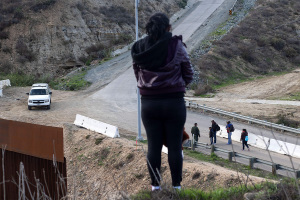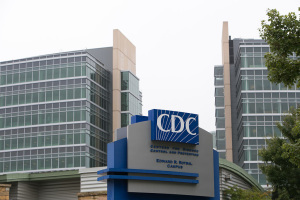Dialogues of the Nation Council of Churches
TAMPA, Florida—The National Council of Churches, under the banner, "For the common Good: Seeking Justice, Working for Peace," reviewed, balanced, and financed its debts. The NCC entered a period of self-examination in conjunction with its relief and development agency, Church World Service, to determine its future at its General Assembly in Tampa November 14-16.
"This is a very important time," said Bishop Christopher Epting, the Episcopal Church's deputy for ecumenical and interfaith relations, in an interview following the meeting.
"They are out from under the financial cloud, but now they must decide what the NCC is all about and what its mission will be in the new century." Epting noted that it was "absurd" to pretend that the NCC represents Christians in the United States without Roman Catholic and Evangelical participants.
"It is essential that we have a wider forum," he said, "a new table that will include a much broader group--even if that includes some risk in not being able to speak with a prophetic voice." Several exploratory meetings with a wide range of church leaders have been held, under NCC auspices, and they issued a statement last May describing how "we began to see a vision of a new life together."
They adopted a name to express that developing vision--Christian Churches Together in the USA.
The Rev. Patrick Mauney, director of Anglican and Global Relations for the Episcopal Church, agreed that the council "has come through a rough patch pretty well. It no longer has to fear for its survival but now it faces a different set of problems. Among them is the mutual commitment of the member churches to making the NCC a body recognized and respected by other Christians in the USA as well as by the general public. Mauney warned,
"Member churches--including the heads of those churches--must be visible advocates of conciliar ecumenism in this country. Otherwise the NCC is just another para-church agency, albeit one a bit out of tune with majority sentiment."
In his comments on "the state of the council," General Secretary Bob Edgar said that, as the new millenium began on January 1, 2000, prospects for the future of the NCC "seemed bleak at best," marred by "tensions over major fiscal and organizational challenges...Internal tensions were rife; relations with Church World Service were at the breaking point. Our financial reserves were depleted and the budget was in deficit, he noted. The loss of confidence by communions, foundations and donors threatened our very existence."
While some predicted the imminent demise of the council, "others were hoping for an instant miracle," Edgar noted. "What did happen was that the faithfulness of our member communions, the valuable contributions of a core staff and the inherent strength of ecumenism gave us a base from which to build."
Edgar announced at the Tampa meeting that the council ended the fiscal year on June 30 with a small operating surplus after facing a budget that had been $5.9 million out of balance and reserves that fell from $24 million in 1994 to $3 million in 1999.
Despite some necessary staff reductions, he said that "our program ministries have become stronger" and support from member communions has grown. He then pointed to the new challenge that calls the NCC "to invent an ecumenism appropriate and sustainable for our times. Such a task requires all the ingenuity and creative thinking that we can muster."
Clarifying the relationship between the council and Church World Service has been a difficult process but, according to Edgar, "We are entering an era of good partnership." Mauney, an NCC vice president and CWS chairman, said that "there is a much healthier relationship between the council and CWS. But we are still living into that relationship." He said that it is important now to "coordinate our international contacts and determine who deals with which issue better."
In his report to the assembly, the Rev. John McCullough, executive director, traced the activities and advocacies of CWS, pointing out that HIV/AIDS is "a critical issue for all of us" and a major component of the new Africa Initiative. "Over 85 percent of the AIDS-related deaths are in Africa," he said. In his report on income and expenditures, total income was almost $70 million.
About a third was used in refugee resettlement assistance, almost 20 percent in disaster relief and recovery, just under 7 percent in hunger development in the United States, under 5 percent in education and advocacy and the rest in mission relationships and witness, administration and fundraising.
The Rev. Robert Welsh, president of the Council on Christian Unity for the Christian Church (Disciples of Christ) and chair of the Strategic Reflection Task Group, asked, "What's the future? What do members expect after 50 years of living together? How do we relate to that larger table, including a wider variety of Christians, in light of the stated purpose to manifest our visible unity in Christ? Are we seeking the same goals, following the same visions? Is the NCC able to meet the expectations of members, given their different understandings?"
Bishop Tom Hoyt of the Christian Methodist Episcopal Church, president-elect of the NCC, said that historic black churches had always been a part of the ecumenical movement but he warned that there was a growing perception that the racial/ethnic agenda was being abandoned in favor of "the larger table and financial stability." He said that he was worried that some relationships among the constituencies of the council would be sacrificed along the way towards change."
Bishop Vicken Aykazian of the Armenian Orthodox Church said that, while he appreciated Edgar's leadership on questioning the rush to war with Iraq, there is still "too much social justice and politics" on the NCC agenda. "Don't forget theology," he pleaded.
"Only by doing theology can we come to visible unity. He was worried that the search for unity doesn't seem to be very important to the NCC now. Meanwhile, Courtney Goto of the World Council of Churches staff for interfaith dialogue argued that the immense diversity of the council makes it impossible to think only in terms of a Christian unity agenda.
She said that the September 11 terrorist attacks was "a reminder of how quickly ignorance can turn to intolerance," resulting in hostility and violence directed at a group of people. "Are we up to the task of educating our young people to have respect for those of other religions?" she asked.
"Where's the interfaith curriculum for those young people?" Lydia Veliko of the United Church of Christ warned that efforts to create a new table through Churches Together "could leave some people behind." She urged the council to "tend old relationships while seeking new ones," warning against what she called the "new best friend mentality." The possibility of war with Iraq emerged on the agenda as a deep concern to the NCC.
Following on a statement by the NCC executive board in October that urged the Bush Administration to step back from the brink of war and to pursue a path of consultation and collaboration with other nations, the assembly unanimously voted to commend President George W.
Bush and Secretary of State Colin Powell for "working through the United Nations towards securing a Security Council resolution to require Iraq to comply with its disarmament obligations under relevant resolutions of the Security Council."
The assembly also urged the president and Congress "to do all possible, without going to war, to ensure Iraqi compliance with the UN resolution adopted November 8." At the same time the resolution called on the president and Congress "to insist on Israeli compliance with all relevant UN Security Council resolutions" and to "play an active role in working toward a peaceful and just resolution of the Israeli-Palestinian conflict within the context of the UN."
The assembly also expressed appreciation for a statement on Iraq by the United States Conference of Catholic Bishops, highlighting the contention that "Iraqi leadership must cease its internal repression, end its threats to its neighbors, stop any support for terrorism, abandon its efforts to develop weapons of mass destruction, and destroy all such existing weapons."
Conclusively, the Bishops warned that war against Iraq "could have unpredictable consequences, not only for Iraq, but for peace and stability elsewhere in the Middle East" and could lead to "wider conflict and instability in the region."



























